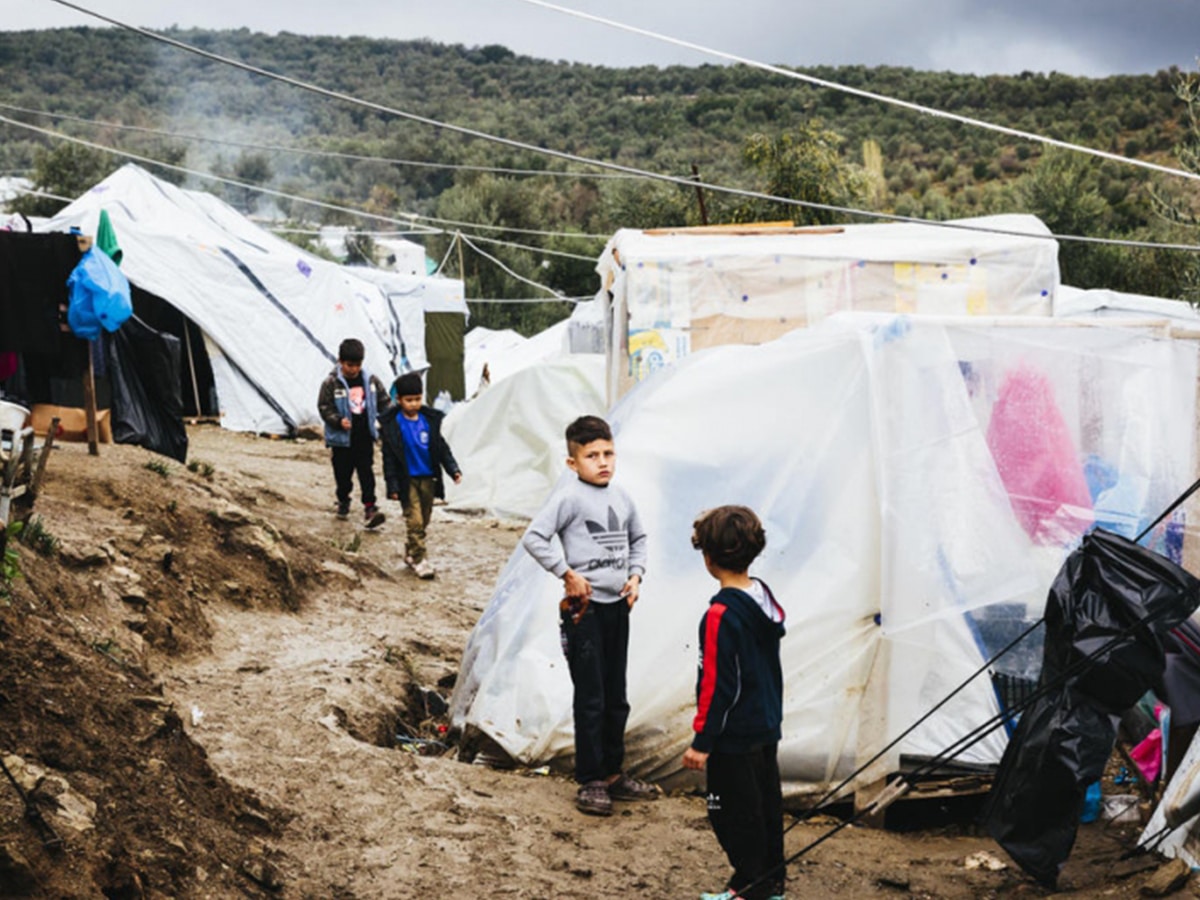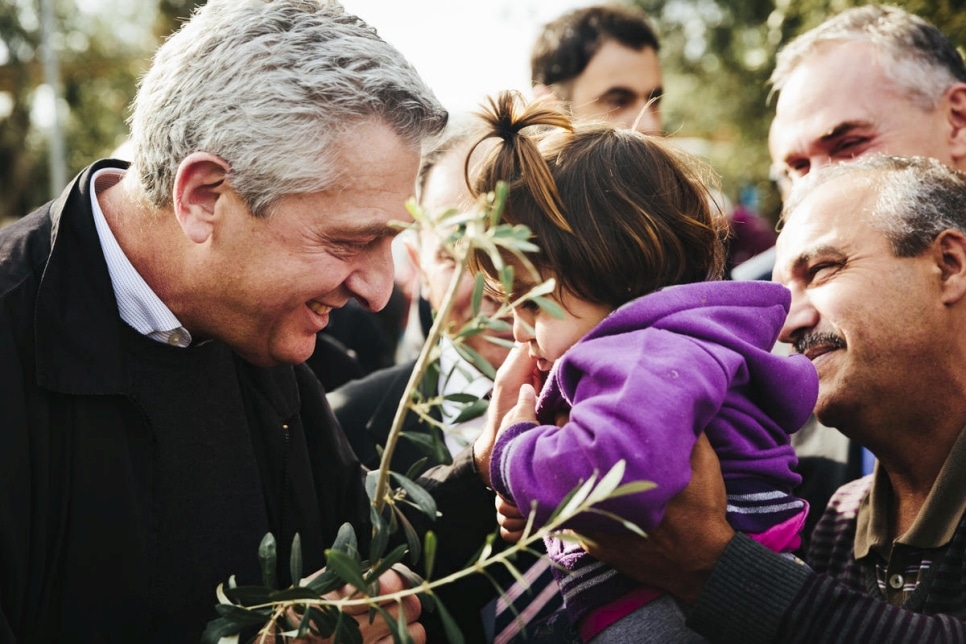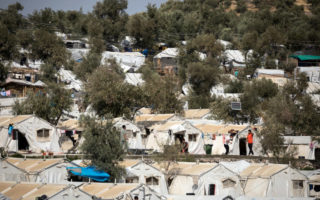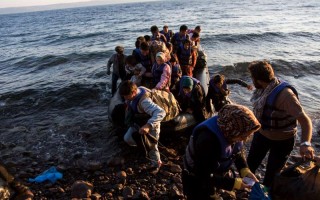
Boys at an improvised camp known as the Olive Grove on Greece’s Lesvos island. The Olive Grove is next to the Moria Reception and Identification centre. © UNHCR/Achilleas Zavallis
Filippo Grandi bears witness to conditions at the Moria centre on Lesvos and calls on European states to help Greece address situation.
Ibrahim Mohamed and his family fled Syria earlier this year when shelling destroyed their house. They sought safety in Europe but now live outside an overcrowded reception and identification centre at Moria, on the Greek island of Lesvos.
From one intolerable situation, they have found another.
“Look at the conditions here, is this humane?” said Ibrahim, 49, on Wednesday. He gestured at the shelters he built from wood and plastic sheeting for himself and close relatives.”
Many of Ibrahim’s neighbours in the improvised overspill camp known locally as the Olive Grove said they felt the same way. The approach of winter has made things worse.
Flimsy tents, wooden pallets and plastic sheeting were no match for this week’s high winds and rain. Filthy water made paths slippery and seeped into dwellings, infusing blankets and clothes with mould.
To make matters worse, the thousands of men, women and children in the unhygienic camp lack privacy and security. Power and hot water are scarce and people have scant access to medical services. There have been repeated incidents of violence and unrest.
Conditions are unacceptable, UN High Commissioner for Refugees Filippo Grandi said on Wednesday during a visit to the site.
“What we are seeing here on Lesvos is very worrying.”
He called on European states to support Greece in addressing the situation and issued an urgent plea for thousands of asylum seekers to be moved into better accommodation.
“What we are seeing here on Lesvos is very worrying,” said Grandi, who was on the island as part of a three-day visit to Greece. “We are in Europe. We cannot accept that people in distress live in such horrifying conditions.”
The situation in Moria has deteriorated sharply since Grandi’s last visit in 2016, mainly due to overcrowding. Some 30,000 asylum-seekers now live in five reception centres on Aegean islands designed for just 5,400.
Against this backdrop, Grandi welcomed Greek government measures to alleviate the situation, including a pledge to transfer 20,000 people to better conditions on the mainland.
“We are encouraged that they will focus on important aspects of the situation: better accommodation, transfer to the mainland, faster processes to determine the legal status and the future of these people,” he said.
Grandi also praised the Greek population for receiving and hosting asylum-seekers. This year Greece received more asylum-seekers than Italy, Spain, Malta and Cyprus combined. Most were families from Afghanistan, Syria and Iraq.
“There needs to be solidarity, there needs to be compassion, there needs to be an understanding that what Greece is doing with incredible generosity and openness needs to be shared more widely,” Grandi said. “We all need to stand together with Greece.”
Grandi also visited staff and partners at the nearby Kara Tepe reception centre. He spoke with women who raised concerns about domestic and sexual violence. Managed by the municipality of Mytilene and UNHCR, Kara Tepe currently houses 1,300 asylum-seekers, with a focus on vulnerable cases.
“Unaccompanied minors need solutions.”
He also met Syrian widow Ibtisam and her children who have special medical needs. The family fled to Greece via Turkey following a bomb attack on their home that killed five family members, including Ibtisam’s husband and sister.
Grandi visited a class at an education centre in Mytilene and expressed concern for the plight of young asylum-seekers and refugees. He appealed to Europe to help the 5,000 unaccompanied minors across Greece, 1,000 of whom are on Lesvos.
“Unaccompanied minors need solutions in terms of safe shelter, education and future prospects,” he said.

UN High Commissioner for Refugees Filippo Grandi greets a girl and her father who reside at the Kara Tepe accommodation site on Greece’s Lesvos island. © UNHCR/Achilleas Zavallis
In Athens, Grandi held talks with Prime Minister Kyriakos Mitsotakis and government representatives to discuss practical and principled actions in addressing the urgent challenges Greece is facing, as well as long-term solutions in supporting refugees to become self-reliant and integrate.
The High Commissioner stressed the key themes of integration and responsibility sharing with a group of mayors who have opened their cities to refugees in a meeting hosted by Athens Mayor Kostas Bakoyannis.
Grandi continues his visit on 28 November where he will address two Committees of the Hellenic Parliament, meet with diplomatic missions and other UN agencies, representatives of the civil society and others involved in the humanitarian effort.
- See also: Greece must act to end dangerous overcrowding in island reception centres, EU support crucial
Originally published on UNHCR on 28 November 2019



